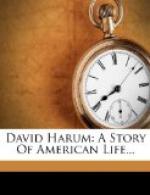“How’s that?” asked Mrs. Cullom.
“Wa’al,” was the reply, “that day was the turnin’ point with me. The next night I lit out with what duds I c’d git together, an’ as much grub ‘s I could pack in that tin pail; an’ the next time I see the old house on Buxton Hill the’ hadn’t ben no Harums in it fer years.”
Here David rose from his chair, yawned and stretched himself, and stood with his back to the fire. The widow looked up anxiously into his face. “Is that all?” she asked after a while.
“Wa’al, it is an’ it ain’t. I’ve got through yarnin’ about Dave Harum at any rate, an’ mebbe we’d better have a little confab on your matters, seein’ ’t I’ve got you ‘way up here such a mornin’ ’s this. I gen’ally do bus’nis fust an’ talkin’ afterward,” he added, “but I kind o’ got to goin’ an’ kept on this time.”
He put his hand into the breast pocket of his coat and took out three papers, which he shuffled in review as if to verify their identity, and then held them in one hand, tapping them softly upon the palm of the other, as if at a loss how to begin. The widow sat with her eyes fastened upon the papers, trembling with nervous apprehension. Presently he broke the silence.
“About this here morgidge o’ your’n,” he said, “I sent ye word that I wanted to close the matter up, an’ seein’ ‘t you’re here an’ come fer that purpose, I guess we’d better make a job on’t. The’ ain’t no time like the present, as the sayin’ is.”
“I s’pose it’ll hev to be as you say,” said the widow in a shaking voice.
“Mis’ Cullom,” said David solemnly, “you know, an’ I know, that I’ve got the repitation of bein’ a hard, graspin’, schemin’ man. Mebbe I be. Mebbe I’ve ben hard done by all my hull life, an’ have had to be; an’ mebbe, now ‘t I’ve got ahead some, it’s got to be second nature, an’ I can’t seem to help it. ‘Bus’nis is bus’nis’ ain’t part of the golden rule, I allow, but the way it gen’ally runs, fur ’s I’ve found out, is, ‘Do unto the other feller the way he’d like to do unto you, an’ do it fust.’ But, if you want to keep this thing a-runnin’ as it’s goin’ on now fer a spell longer, say one year, or two, or even three, you may, only I’ve got somethin’ to say to ye ’fore ye elect.”
“Wa’al,” said the poor woman, “I expect it ‘d only be pilin’ up wrath agin’ the day o’ wrath. I can’t pay the int’rist now without starvin’, an’ I hain’t got no one to bid in the prop’ty fer me if it was to be sold.”
“Mis’ Cullom,” said David, “I said I’d got somethin’ more to tell ye, an’ if, when I git through, you don’t think I’ve treated you right, includin’ this mornin’s confab, I hope you’ll fergive me. It’s this, an’ I’m the only person livin’ that ‘s knowin’ to it, an’ in fact I may say that I’m the only person that ever was really knowin’ to it. It was before you was married, an’ I’m sure he never told ye, fer I don’t doubt he fergot all about it, but your husband, Billy P. Cullom, that was, made a small investment once on a time, yes, ma’am, he did, an’ in his kind of careless way it jest slipped his mind. The amount of cap’tal he put in wa’n’t large, but the rate of int’rist was uncommon high. Now, he never drawed no dividends on’t, an’ they’ve ben ‘cumulatin’ fer forty year, more or less, at compound int’rist.”




